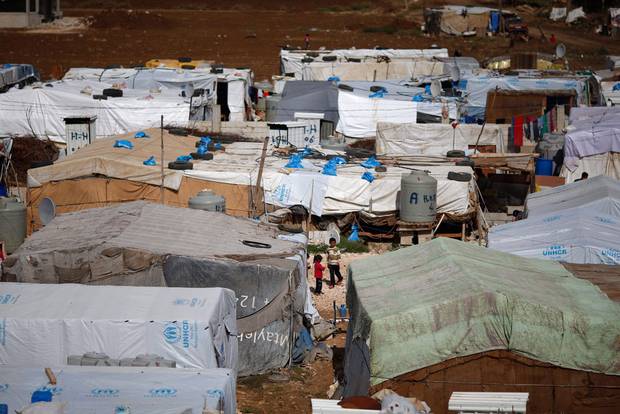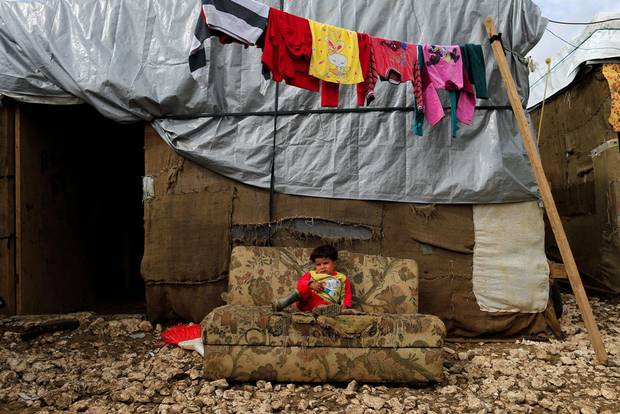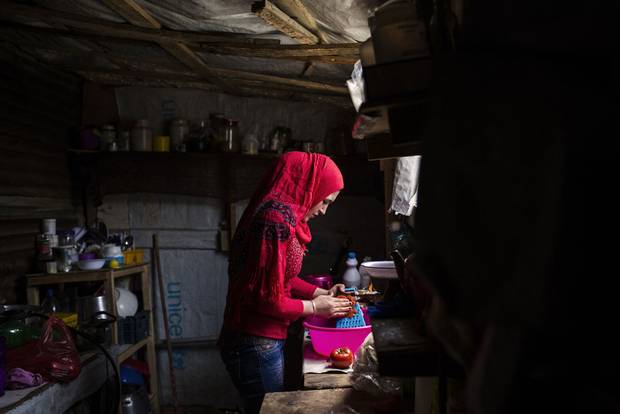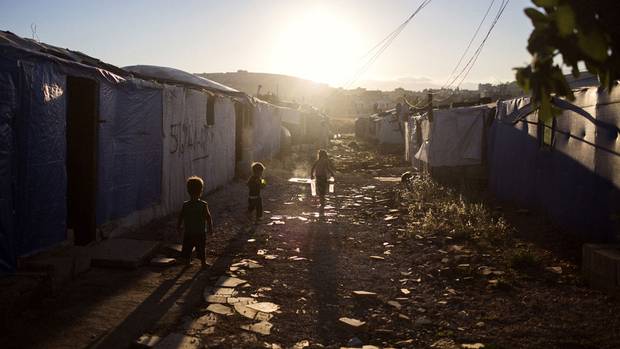It's like a prison," Akaber Mohammed says of her family's life as refugees in Lebanon. "No, it's a coffin," her husband, Khaled al-Lawz, counters. "And I'm suffocating inside it."
Ms. Mohammed and Mr. al-Lawz have lived for the past three years in a tent that Mr. al-Lawz built from tarps and two-by-fours in Lebanon's scenic Bekaa Valley. As hundreds of thousands of Syrian refugees like them have made their way by land and sea to an increasingly unwelcoming Europe, they and their four children have remained in Lebanon, watching their finances crumble and their options dwindle.
Even before the Paris attack, the 1.1 million registered Syrian refugees in Lebanon – many of whom are among the poorest of those fleeing their homeland's civil war – lived in an increasingly precarious limbo. Now, the bloodshed unleashed in France by Islamic extremists is deepening European fears of Muslims and threatening to create an atmosphere even less welcoming for those fleeing war in the Middle East.
Ms. Mohammed and Mr. al-Lawz say they, too, dream of new lives far away from the war-torn Middle East. But they want to do it legally, with visas in hand from a Western embassy for them and their two young children.
"I'm the kind of person who only does what is allowed by the law," Mr. al-Lawz explains. "My heart cries for them," he says of those who have gone ahead to Europe without visas. "But I think they are doing things too quickly."

Syrian refugees stand outside their tents at a Syrian refugee camp in the town of Hosh Hareem, in the Bekaa valley, east Lebanon, Wednesday, Oct. 28, 2015.
Hassan Ammar/AP Photo
So far, Mr. al-Lawz's strategy has not paid off very well. The stipend Syrian refugees receive from the World Food Programme has fallen dramatically – from a monthly $30 (U.S.) per person they received last year to $13.50 for the first 10 months of this year – as the UN body faced funding shortfalls. That trend has seen a small reverse since the refugee crisis arrived in Europe, allowing the WFP to raise payments to $21.60 starting in November.
"The refugee crisis in Lebanon is as real as ever, and conditions are worsening," says Dana Sleiman, spokeswoman for the United Nations High Commissioner for Refugees. "Refugees have depleted their resources and they're relying more and more on dwindling humanitarian assistance."
Where once Ms. Mohammed and Mr. al-Lawz resided in a two-storey home in Homs, living on his income as a real-estate salesman, today the couple's 14-year-old son Omar is the family's main breadwinner. Omar earns between 75 cents and $1 an hour doing construction work to supplement the WFP payments.
"I feel like I was living on the 10th floor, and I now I've fallen into the basement," says Mr. al-Lawz, who struggles to find manual work himself because of an advanced case of rheumatism.

As of 6 May 2015, UNHCR Lebanon temporarily suspended new registration as per Government of Lebanon’s instructions. Total, the UN’s refugee agency estimates there are 1,075,637 registered Syrian refugees living in Lebanon, a country of slightly more than 4 million people.
Trish McAlaster/The Globe and Mail
Much of the money from WFP and Omar's labours goes to the $50 monthly rent they pay for the rocky piece of farmland the family's tent is built on. It's a sadly common arrangement in the Bekaa: landlords charging refugees rent they can't afford for land to pitch a trent on, rent that is often paid back with the proceeds of child labour.
It's a result of a controversial policy that has seen Lebanon – scarred by its experience with Palestinian refugee camps that have grown into small, troubled cities over their 67-year existence – refuse to allow the construction of formal UN camps to house the Syrians.
As a result, Syrian refugees are scattered across the country, leaving aid workers scrambling to keep up with their needs, and security services guessing at their whereabouts. There are some 2,000 informal tent camps like the one Ms. Mohammed and Mr. al-Lawz live in, which is known as Saadnayel-007.
Some of the groupings are made up of just four or five tents. Saadnayel-007 is a more typical gathering of 20 makeshift shelters. Other "camps" consist of several hundred. In the Bekaa Valley, makeshift tents crowd both sides of a small stream that's badly polluted with waste and sewage, while tin outhouses line the potholed dirt road that is the main drag for seven or eight informal settlements.
Other Syrians, depending on how much of their savings remain, can be spotted everywhere from the five-star hotels of Beirut, to the construction sites and abandoned buildings of the Lebanese capital.
An unknown number have moved into the established Palestinian camps; refugees from one Middle East crisis moving in beside those who fled an older and even more intractable one.
Hala el-Helou, an adviser to Lebanon's Minister of Humanitarian Affairs, says the real number of Syrians in the country is higher than the number registered with the UNHCR, closer to 1.5 million. Which is why the country, back in January, stopped accepting new asylum-seekers.
"We don't have the means anymore, we don't have the infrastructure, we don't have the place. Lebanon is a small, tight country which is already overpopulated," Ms. el-Helou said in an interview.
The cash-strapped Lebanese government also recently raised the bureaucratic barriers for Syrians living in the country – reinstating a $200-per-person annual fee for the papers required to officially live and work here, and demanding that each applicant have a Lebanese sponsor. The measures mean most Syrian refugees lack the paperwork to legally travel through the military checkpoints that dot the winding highways of the Bekaa Valley.
So most simply remain in their tents, unable to travel even if they had the money to. "I can go from here to the centre of the next town. I'm safe within about one kilometre from here. If I go further than that, I'm afraid I'll be stopped by police," says Khaled al-Ali, a 45-year-old father of two who also supports his elderly mother.
Like Mr. al-Lawz, Mr. al-Ali has the bearing of a man who was once well-off in Syria, where he ran a mattress-making company before the war.
Today, the unrepaired crack in the lens of his eyeglasses hints at how far he's fallen. His family lives on a small salary he receives as an art teacher – a talent he only discovered after arriving in Lebanon – at the informal local school. They recently received a letter saying the family had been cut off from receiving even the WFP stipend because their family had been deemed "too small" to require help.
"If I overthink these things I get upset and have to go to the doctor's," says Mr. al-Ali, who has had heart surgery. "And we can't afford that."

A Syrian refugee child sits on a sofa outside her family’s tent at a refugee camp in the town of Hosh Hareem, in the Bekaa valley, east Lebanon, Wednesday, Oct. 28, 2015.
Hassan Ammar/AP Photo
'That's one street here'
Canada, everyone here has heard, has a plan to take in 25,000 Syrian refugees by the end of the year – "it's all on What's App," Mr. al-Ali says with a smile. Mention of Prime Minister Justin Trudeau's promise brightens refugees' faces, perhaps hoping that their interaction with a Canadian reporter might increase their chances of being among the chosen few.
And 25,000 – in terms of what Lebanon and other countries in the region are dealing with – is really only a few. In addition to the more than one million Syrians in Lebanon, Jordan is sagging under the weight of 630,000 registered refugees there (again, that's just the official number), turning the UNHCR's Zaatari refugee camp, in the desert near the Syrian border, into Jordan's fourth-largest city.
Turkey, meanwhile, has an estimated 2.2 million refugees within its borders, a number that remains almost constant despite the daily outflow of thousands of refugees hoping to reach Europe. There are another 245,000 Syrian refugees in Iraq, most of them in the Kurdish north of the country. The European Union, in turn, is struggling to deal with the economic and social implications of some 750,000 new arrivals this year. The majority of those are also from Syria, though Afghans and Iraqis are prominent in the tide as well.
The Liberal government's plan has caused consternation across the political spectrum in Canada, with worries of potential security concerns and even refugee advocacy groups warning that bringing in 25,000 by Jan. 1 is just too many people, too fast.
Those involved in dealing with the Syrian refugee crisis in Lebanon scoff at such concerns. "That's one street here," says Maria Assi, chief executive officer of the Beyond Association, a UNICEF-supported group that runs 87 informal refugee schools. "We take care of 20,000 kids, just at Beyond."
Ms. el-Helou tries to keep a diplomatic straight face when asked what difference Canada's contribution will make on the ground in Lebanon. "We do support any initiatives to help," the government adviser says. "But let's just say that Asal alone – a town in the north of Bekaa – is currently hosting 80,000 [Syrian refugees]. And the Lebanese population of the town is 35,000. Let's say that a couple of other towns are the same, and that Lebanese villages are smaller [geographically] than villages in other countries."
Ms. el-Helou pauses. "So 25,000 is a good number, as a start."
She says the Canadian officials she's met with were also interested – as most Western governments are – in first helping those refugees that either had family already in Canada, or the language and other skills to help them quickly adapt to life in the new country.
In other words, they want the brightest and the best-connected. Leaving Lebanon with the poor and the less-skilled – and potentially more trouble down the road.

Syrian teenager Basima prepares food in a makeshift shelter in Zahle, Lebanon in May, 2015. Refugees receive about $20 U.S. per person per month from the World Food Programme
Diego Ibarra Sánchez/MeMo
'I just started crying'
The likely source of longer-term problems is the hundreds of thousands of school-age Syrian children scattered around the Middle East who are receiving no classes or counselling of any kind. Human Rights Watch estimates that there are 400,000 children not in school in Turkey alone, and roughly half that number in Lebanon.
The kids don't just need help with their reading, writing and arithmetic, though the gap between them and their peers grows with every year out of school. They also desperately need help coping with what they've seen. In Jordan's Zaatari refugee camp, Syrian children asked to draw pictures of their old homes hand back scenes of tanks and airplanes bombing villages filled with dead bodies, or just pages covered in black scribbles.
The same experiences haunt the Syrian children growing up in Lebanon. "I was walking with my friend Aya. I looked away – I don't remember at what – and when I looked back she was lying [dead] on the ground. I just started crying," is 12-year-old Fatima al-Lawz's most prominent memory of the war. She is the only daughter of Ms. Mohammed and Mr. al-Lawz; her voice accelerates and she pulls at the sleeves of her hooded sweatshirt as she tells the tale.
Fatima now attends classes for four hours a day at one of the informal schools run by Beyond, and her teachers are trying to help her work through her trauma and grief via her love of music, and writing songs about her experiences.
But Beyond can't force parents to send their children to school. Many young boys are asked by their parents to instead work and earn desperately needed cash. Many girls – especially if they're unmarried in their teenage years – are kept from leaving their tents by parents terrified of what could happen to them in tent cities that are only loosely monitored by the Lebanese police.
Fear of what will become of their children if they grow up in the camps is the number one reason Syrian refugees cite for joining the tide to Europe. The same holds true for those who remain in limbo in the Middle East.
"My parents think it will be best for us to go to another country because here we can't afford to pay for our rent and my brother has to work. They say that if we go abroad, we get a home for free and go to school for free," says Fatima. But she's seen too much in her 12 years to trust such things.
"I don't believe this will happen," she says, pulling again at her sleeves. "Why should anybody give us anything for free?"
The series tells the stories of refugee families in pursuit of better lives:



